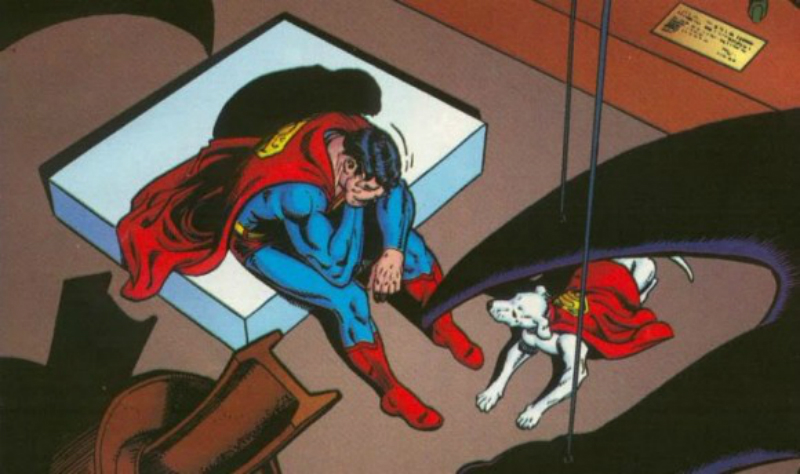Lewis Howes is a former American football and handball player, and is now an entrepreneur and an author of The School of Greatness. He also has a podcast of the same name. He is looked upon as a super-hero in the States. In fact, he himself used to think of himself as an impenetrable super-hero who could supress his darkest emotions and put up a brave face when challenged by adversity. One freak outburst incident made him change his mind. At the World Domination Summit 2015, Lewis urges us to tear down the facade of iron-clad straight face and be more human and express our feelings. He advocates vulnerability. In his own beautiful worlds, “Don’t be a super-hero. Be a super-human.”
I can totally agree with what Lewis says since my core personality was just like his. I wouldn’t want to show my feelings on my face. I refused to ask for help. I would shut out my past as if I had a valve in my psyche. But recently, I have put in some changes. Mainly with the help of Priya (my wife) and others close to me in my family, I have learned to open up and express myself deeper. What used to be long periods of reserved behaviour with sudden surprising outbursts is now smoothening up.
Here are some of the reasons why I feel that expressing myself deeper led to a better me.
Expressing frees up the mind
Let’s face it. Our minds have too many things to take care of everyday. We do not need those unexpressed feelings to settle into the corner of our brain and nagging at us all day. When I transitioned from keeping quiet about things to expressing them more, the feeling of resentment would just go away. If I were unhappy about things in the past, I would just adjust with it, but keep feeling the resentment. For instance, when people played songs too loudly on their mobile phones, I would keep quiet, but seethe inside. After I resolved to express myself, I started talking to the such ‘offenders’ politely about the problem and immediately felt my resentment disappear.

However, it is not only for these at-the-moment annoyances that discussing frees your brain. One of the best things I have done is to talk to my wife about my past failed relationship. It felt gratifyingly relieving, especially since Priya is a darling and understood my stories beautifully well. Talking about the past to a loved one, who unconditionally loves you, can be especially mind-relieving.
Talking about it can bring unexpected solutions
It’s not often that people talk about unpleasant or embarrassing problems such as self-inflicted credit card debts or about a fight they had with someone close. Business failures is another such issue. However you never know how talking about it to someone can put you one step closer to the solution. Putting up a brave face and trying to fight it alone may sometimes prolong the predicament for longer than needed.
It may be common for countries like the USA and some in Europe to rack up credit card debts. However, in India, it is uncommon to typically use a credit card for purchases except for in the metro cities. People reach for cheques to pay large amounts, cash for any amount within 4 figures and then fall back to debit cards for digital currency. Credit card debts are virtually unheard of and you will be deemed extremely irresponsible to have racked up big amounts of debt on a piece of plastic. However, due credit to my irresponsibilty, I did manage to fall into debt and even put up a brave face without telling anyone. I didn’t want anyone else to hear about or deal with my mess. I was paying back the debt in tiny pieces every month. However, my parents did find out when they happened to open the credit card statement a certain month. We did have to talk about it. They pointed out that rather than pay the installment to the bank with an interest, I should rather pay them in installments without any interest. Instead they would pay out my debt if full. Whew, problem solved. Just like that!
You never know how people can go out of their way to help you or connect you to someone who can help.
People trust you more
Contrary to what we may believe, talking about our flawed past can actually make people appreciate us more as humans and build trust. Since we are willing to accept our past with all its flaws and be ready to open it up, people see it as an outstretched hand. It sends the signal that you trust them and appreciate their support. In turn they feel that you too are trust-worthy.

While talking to students or aspiring freelancers about my freelance success stories, I also share stories where I goofed up, failed to deliver to clients or in fact, even quarreled with clients immaturely. Talking about my failures adds the genuineness to the story and doesn’t make it look like life is unnaturally smooth-sailing.
Talking often can prevent pent-up outbursts
Lewis Howes talks about an incident where he punched a fellow basketball player over a minor squabble, due to pent-up anger building inside him. He never talked about his feelings to anyone until they all came out in an ugly way. While I have not punched someone or broken bones, I do have my outburst scenes where I yell unreasonably at a poor person for no fault of his/hers. Rather than one small incident triggering me, I used to let many annoyances build up without talking about them until the floodgates open in an unreasonable manner suddenly. Talking about my negative emotions has curbed my outbursts over the past few months.
People understand your behaviour better
Traffic lights are just colourful lamps in India. The more you move away from the hearts of cities and drive in the suburbs, traffic light flouting is almost a norm rather than an exception. Traffic junctions at places like Nariman Point (Mumbai) or Janpath (New Delhi) are extremely disciplined, while those at suburbs like Thane and Gurgaon are whirlpools of vehicles pointing at every direction. The behaviour is ingrained in almost every Indian driver, be it the educated high class with a Mercedes or a daily wage worker riding his 50cc two-wheeler. Junction points not guarded by signals are downright chaotic as Indian driving generally has no ethics such as ‘right of way’.
So it came as a complete surprise and perhaps as a source of frustration for Priya that I would patiently wait through every traffic light and junction, while others seemed to squeeze through whatever spaces were available. Our commutes seemed to take way too long because of my rather ‘altruistic’ driving. One day I talked to her about it and told her that I had been part of two road accidents. One involved my motorbike, in which I almost killed my cousins (all of them under 13 years of age), who were riding with me. An auto-rickshaw had crossed our path without signalling and I had crashed head-on with it at about 50kmph. The second incident was when I was not competent enough to drive a car uphill and had over-accelerated and under-steered on a hairpin bend and smashed into a light pole, caused some minor damages to a nearby autorickshaw and cracked my radiator. I continued to drive and overheated the car and its engine. Needless to say, I forked out quite a fortune for repairs.
I explained to Priya that those incidents caused me to drive cautiously, watching every junction and signal. Accidents can be caused even by others’ recklessness and not your own. So it pays to keep distance where other vehicles may act aggressively. Priya’s thoughts about my driving changed. She in fact admits that she may might been scared out of ever driving after such accidents.
Conclusion
Are you more of a ‘super-hero’ or a ‘super-human’? Has talking about your past helped you cope? Or would you rather hide your past in the shadows? Please let me know in the comments.

It is these conversations that broke some invisible barriers and brought us really close…the space to have non-judgmental sharing of past and present I would say is the most important to intimate relationships and I’m glad we got there. 🙂